Herbert Wells - A Short History of the World
Здесь есть возможность читать онлайн «Herbert Wells - A Short History of the World» весь текст электронной книги совершенно бесплатно (целиком полную версию без сокращений). В некоторых случаях можно слушать аудио, скачать через торрент в формате fb2 и присутствует краткое содержание. Год выпуска: 2011, Жанр: История, на английском языке. Описание произведения, (предисловие) а так же отзывы посетителей доступны на портале библиотеки ЛибКат.
- Название:A Short History of the World
- Автор:
- Жанр:
- Год:2011
- ISBN:нет данных
- Рейтинг книги:4 / 5. Голосов: 1
-
Избранное:Добавить в избранное
- Отзывы:
-
Ваша оценка:
- 80
- 1
- 2
- 3
- 4
- 5
A Short History of the World: краткое содержание, описание и аннотация
Предлагаем к чтению аннотацию, описание, краткое содержание или предисловие (зависит от того, что написал сам автор книги «A Short History of the World»). Если вы не нашли необходимую информацию о книге — напишите в комментариях, мы постараемся отыскать её.
A Short History of the World — читать онлайн бесплатно полную книгу (весь текст) целиком
Ниже представлен текст книги, разбитый по страницам. Система сохранения места последней прочитанной страницы, позволяет с удобством читать онлайн бесплатно книгу «A Short History of the World», без необходимости каждый раз заново искать на чём Вы остановились. Поставьте закладку, и сможете в любой момент перейти на страницу, на которой закончили чтение.
Интервал:
Закладка:
Photo: Fred Boissonnas
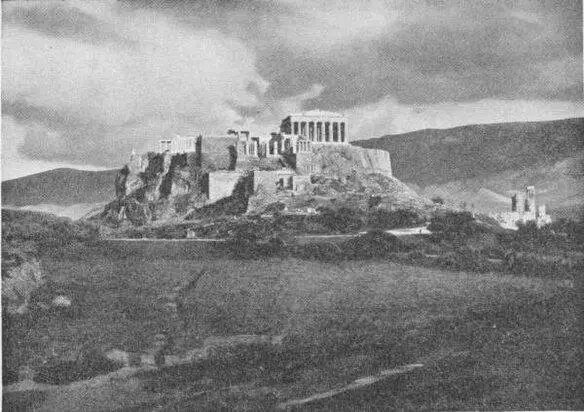
THE ACROPOLIS, ATHENS
The marvellous group of Temples and monuments built under the inspriration of Pericles
Photo: Fred Boissonnas
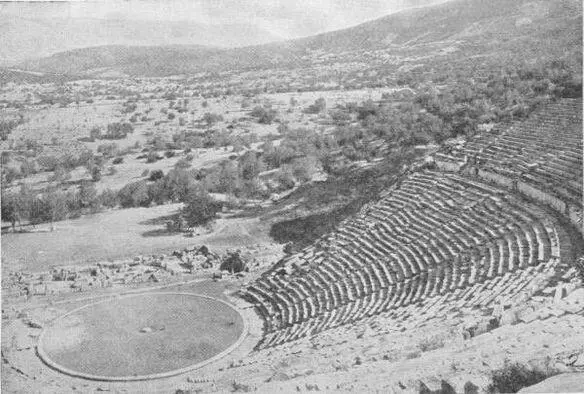
THE THEATRE AT EPIDAUROS, GREECE
A wonderfully preserved specimen showing the vast auditorium
Photo: Fred Boissonnas
Chief among these young men was Plato (427 to 347 B.C.) who presently began to teach philosophy in the grove of the Academy. His teaching fell into two main divisions, an examination of the foundations and methods of human thinking and an examination of political institutions. He was the first man to write a Utopia, that is to say the plan of a community different from and better than any existing community. This shows an altogether unprecedented boldness in the human mind which had hitherto accepted social traditions and usages with scarcely a question. Plato said plainly to mankind: “Most of the social and political ills from which you suffer are under your control, given only the will and courage to change them. You can live in another and a wiser fashion if you choose to think it out and work it out. You are not awake to your own power.” That is a high adventurous teaching that has still to soak in to the common intelligence of our race. One of his earliest works was the Republic, a dream of a communist aristocracy; his last unfinished work was the Laws, a scheme of regulation for another such Utopian state.
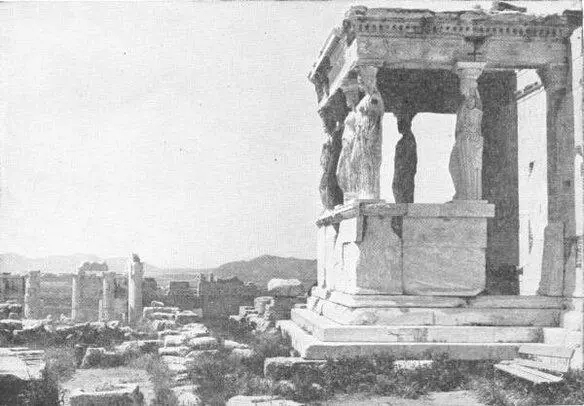
THE CARYATIDES OF THE ERECHTHEUM
The ancient sanctuary on the Acropolis at Athens
Photo: Fred Boissonnas
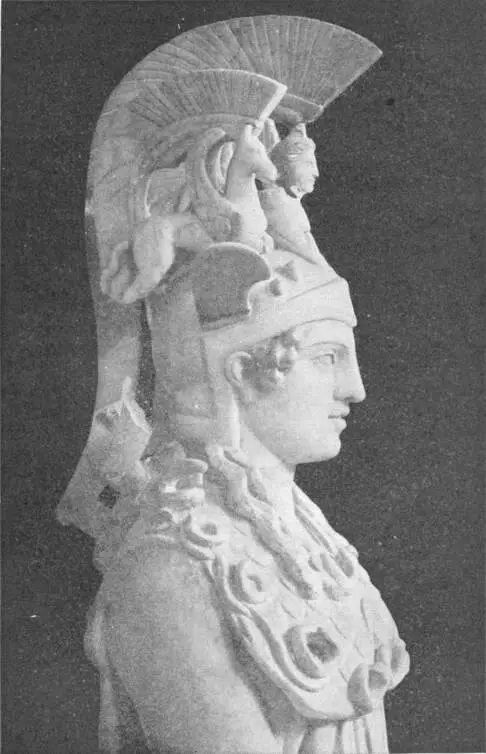
ATHENE OF THE PARTHENON
Photo: Alinart
The criticism of methods of thinking and methods of government was carried on after Plato’s death by Aristotle, who had been his pupil and who taught in the Lyceum. Aristotle came from the city of Stagira in Macedonia, and his father was court physician to the Macedonian king. For a time Aristotle was tutor to Alexander, the king’s son, who was destined to achieve very great things of which we shall soon be telling. Aristotle’s work upon methods of thinking carried the science of Logic to a level at which it remained for fifteen hundred years or more, until the mediæval schoolmen took up the ancient questions again. He made no Utopias. Before man could really control his destiny as Plato taught, Aristotle perceived that he needed far more knowledge and far more accurate knowledge than he possessed. And so Aristotle began that systematic collection of knowledge which nowadays we call Science. He sent out explorers to collect facts . He was the father of natural history. He was the founder of political science. His students at the Lyceum examined and compared the constitutions of 158 different states ....
Here in the fourth century B.C. we find men who are practically “modern thinkers.” The child-like, dream-like methods of primitive thought had given way to a disciplined and critical attack upon the problems of life. The weird and monstrous symbolism and imagery of the gods and god monsters, and all the taboos and awes and restraints that have hitherto encumbered thinking are here completely set aside. Free, exact and systematic thinking has begun. The fresh and unencumbered mind of these newcomers out of the northern forests has thrust itself into the mysteries of the temple and let the daylight in.
XXVI
THE EMPIRE OF ALEXANDER THE GREAT
FROM 431 to 404 B.C. the Peloponnesian War wasted Greece. Meanwhile to the north of Greece, the kindred country of Macedonia was rising slowly to power and civilization. The Macedonians spoke a language closely akin to Greek, and on several occasions Macedonian competitors had taken part in the Olympic games. In 359 B.C. a man of very great abilities and ambition became king of this little country—Philip. Philip had previously been a hostage in Greece; he had had a thoroughly Greek education and he was probably aware of the ideas of Herodotus—which had also been developed by the philosopher Isocrates—of a possible conquest of Asia by a consolidated Greece.
He set himself first to extend and organize his own realm and to remodel his army. For a thousand years now the charging horse-chariot had been the decisive factor in battles, that and the close-fighting infantry. Mounted horsemen had also fought, but as a cloud of skirmishers, individually and without discipline. Philip made his infantry fight in a closely packed mass, the Macedonian phalanx, and he trained his mounted gentlemen, the knights or companions, to fight in formation and so invented cavalry. The master move in most of his battles and in the battles of his son Alexander was a cavalry charge. The phalanx held the enemy infantry in front while the cavalry swept away the enemy horse on his wings and poured in on the flank and rear of his infantry. Chariots were disabled by bowmen, who shot the horses.
With this new army Philip extended his frontiers through Thessaly to Greece; and the battle of Chæronia (338 B.C.), fought against Athens and her allies, put all Greece at his feet. At last the dream of Herodotus was bearing fruit. A congress of all the Greek states appointed Philip captain-general of the Græco- Macedonian confederacy against Persia, and in 336 B.C. his advanced guard crossed into Asia upon this long premeditated adventure. But he never followed it. He was assassinated; it is believed at the instigation of his queen Olympias, Alexander’s mother. She was jealous because Philip had married a second wife.
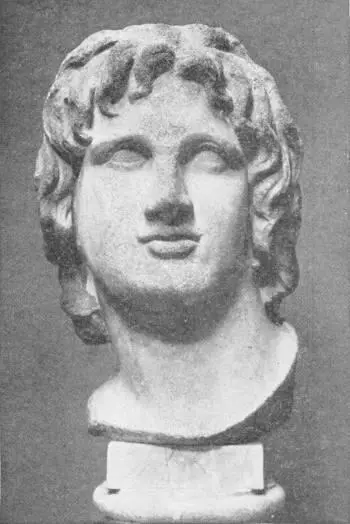
BUST OF ALEXANDER THE GREAT
(As in the British Museum)
But Philip had taken unusual pains with his son’s education. He had not only secured Aristotle, the greatest philosopher in the world, as this boy’s tutor, but he had shared his ideas with him and thrust military experience upon him. At Chæronia Alexander, who was then only eighteen years old, had been in command of the cavalry. And so it was possible for this young man, who was still only twenty years old at the time of his accession, to take up his father’s task at once and to proceed successfully with the Persian adventure.
In 334 B.C.—for two years were needed to establish and confirm his position in Macedonia and Greece—he crossed into Asia, defeated a not very much bigger Persian army at the battle of the Granicus and captured a number of cities in Asia Minor. He kept along the sea-coast. It was necessary for him to reduce and garrison all the coast towns as he advanced because the Persians had control of the fleets of Tyre and Sidon and so had command of the sea. Had he left a hostile port in his rear the Persians might have landed forces to raid his communications and cut him off. At Issus (333 B.C.) he met and smashed a vast conglomerate host under Darius III. Like the host of Xerxes that had crossed the Dardanelles a century and a half before, it was an incoherent accumulation of contingents and it was encumbered with a multitude of court officials, the harem of Darius and many camp followers. Sidon surrendered to Alexander but Tyre resisted obstinately. Finally that great city was stormed and plundered and destroyed. Gaza also was stormed, and towards the end of 332 B.C. the conqueror entered Egypt and took over its rule from the Persians.
Читать дальшеИнтервал:
Закладка:
Похожие книги на «A Short History of the World»
Представляем Вашему вниманию похожие книги на «A Short History of the World» списком для выбора. Мы отобрали схожую по названию и смыслу литературу в надежде предоставить читателям больше вариантов отыскать новые, интересные, ещё непрочитанные произведения.
Обсуждение, отзывы о книге «A Short History of the World» и просто собственные мнения читателей. Оставьте ваши комментарии, напишите, что Вы думаете о произведении, его смысле или главных героях. Укажите что конкретно понравилось, а что нет, и почему Вы так считаете.








